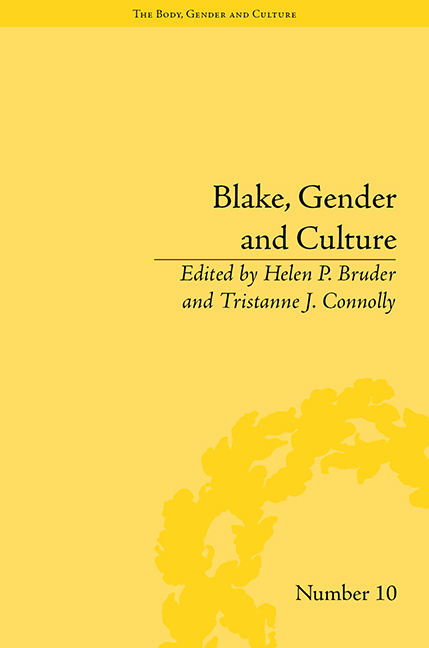Book contents
- Frontmatter
- CONTENTS
- Acknowledgements
- List of Contributors
- List of Figures
- Abbreviations
- Introduction: Naked History Displayed
- 1 ‘Merely a Superior Being’: Blake and the Creations of Eve
- 2 The Last Strumpet: Harlotry and Hermaphroditism in Blake's Rahab
- 3 Sex, Violence and the History of this World: Blake's Illustrations to the Book of Enoch
- 4 Bridal Mysticism and ‘Sifting Time’: The Lost Moravian History of Blake's Family
- 5 ‘A Secret Common to Our Blood’: The Visionary Erotic Heritage of Blake, Thomas Butts and Mary Butts
- 6 Changing the Sexual Garments: The Regeneration of Sexuality in Jerusalem
- 7 Philoprogenitive Blake
- 8 ‘Seeking Flowers to Comfort Her’: Queer Botany in Blake's Visions, Darwin's Loves and Wollstonecraft's Rights of Woman
- 9 ‘Or Wilt Thou Go Ask the Mole?’: (Con)Figuring the Feminine in Blake's Thel
- 10 Gendering the Margins of Gray: Blake, Classical Visual Culture and the Alternative Bodies of Ann Flaxman's Book
- 11 The Virgil Woodcuts Out of Scale: Blake's Gigantic, Masculine Pastoral
- 12 Closet Drama: Gender and Performance in Blake and Joanna Baillie
- Notes
- Works Cited
- Index
9 - ‘Or Wilt Thou Go Ask the Mole?’: (Con)Figuring the Feminine in Blake's Thel
- Frontmatter
- CONTENTS
- Acknowledgements
- List of Contributors
- List of Figures
- Abbreviations
- Introduction: Naked History Displayed
- 1 ‘Merely a Superior Being’: Blake and the Creations of Eve
- 2 The Last Strumpet: Harlotry and Hermaphroditism in Blake's Rahab
- 3 Sex, Violence and the History of this World: Blake's Illustrations to the Book of Enoch
- 4 Bridal Mysticism and ‘Sifting Time’: The Lost Moravian History of Blake's Family
- 5 ‘A Secret Common to Our Blood’: The Visionary Erotic Heritage of Blake, Thomas Butts and Mary Butts
- 6 Changing the Sexual Garments: The Regeneration of Sexuality in Jerusalem
- 7 Philoprogenitive Blake
- 8 ‘Seeking Flowers to Comfort Her’: Queer Botany in Blake's Visions, Darwin's Loves and Wollstonecraft's Rights of Woman
- 9 ‘Or Wilt Thou Go Ask the Mole?’: (Con)Figuring the Feminine in Blake's Thel
- 10 Gendering the Margins of Gray: Blake, Classical Visual Culture and the Alternative Bodies of Ann Flaxman's Book
- 11 The Virgil Woodcuts Out of Scale: Blake's Gigantic, Masculine Pastoral
- 12 Closet Drama: Gender and Performance in Blake and Joanna Baillie
- Notes
- Works Cited
- Index
Summary
But who are we? Are we really intact before these images? Or do they also look back at us and banish us to a realm that is prior to the speakability of the ‘I’?
– Judith Butler, Foreword to The Matrixial Borderspace (2006)Following Helen Bruder's 1997 study of patriarchal criticism and The Book of Thel, this essay outlines the limitations of reading this poem through phallic logic, and calls instead for a thinking ‘in, of, and from the feminine’, via Bracha Ettinger's theory of a matrixial borderspace, the shared space created by co-emerging subjectivities, where self and other develop in ‘a continual readjustment of distances, a continual negotiation of separateness and distance’. The aim of this paper is twofold: first, to demonstrate how Thel is a model of this expanded subjectivity, and second, to show how within the space of the poem it offers an account of the intrauterine experience, that mysterious existence gestured at and immediately foreclosed in Freud's account of the uncanny. In its capacity as a space of multiplicity (of one to become more-than-one), the figure of the matrix enables us to understand the processes of subjectivity between Thel, the Lilly, Cloud, Clod of Clay, Worm and the Vales of Har as encounters, as co-creating shared spaces, which moreover demonstrates how Blake's feminine – at least in the curious case of Thel – appeals to contemporary post-Lacanian models of subjectivity.
- Type
- Chapter
- Information
- Blake, Gender and Culture , pp. 123 - 132Publisher: Pickering & ChattoFirst published in: 2014



